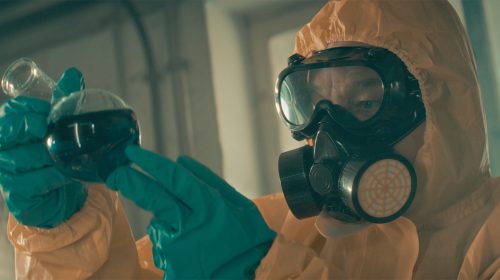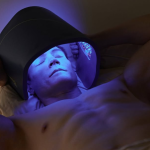Heavy Metal Detoxes? Why You’re Being Sold Fear

You’ve likely seen the now-popular heavy metal detoxes online, with people making smoothies made from blueberries and coriander that nourish away the metal or selling foot spas designed to suck toxins from your soles.
Whether they’re actually necessary – or just another wellness trend making us scared of a risk that doesn’t exist – is complicated. Heavy metals, like lead and arsenic, are obviously deadly to humans. Other metals, like iron, are necessary minerals that our body loves. But with ‘clean’ living going viral again thanks to Donald Trumps’ not-always-scientifically-backed Make America Health Again (MAHA) movement, we’re being warned that heavy metals are everywhere – and making us sick.
‘I think heavy metal detoxes are trending due to a mix of growing health awareness, fear-driven wellness marketing, and the desire to take control of invisible health risks,’ says certified nutritionist, personal trainer and trainee counsellor and psychologist, Georgia Kohlhoff. ‘There’s no doubt that fear sells, especially when it comes to health.’
This is only supercharged when paired with growing understanding about the environmental influences on our health, from concerns about microplastics and air pollution to pesticide exposure and ultra-processed foods. ‘These are valid conversations, and they’ve made people more conscious of what they’re exposed to. But that doesn’t mean every fear is rooted in risk,’ says Kohlhoff.
Do we have heavy metals in our bodies?
It’s likely we’ve all been exposed to heavy metals. Our environment is becoming less and less healthy for us – yet most of us are still safe. A study from the journal Nature found that most metal levels in European soil were within safe limits, but copper and lead were too high. Research has also found heavy metals in everything from tampons to clothing, and mercury exposure is why public health guidelines recommended eating just one portion of oily fish a week.
‘Heavy metals like lead, mercury, arsenic and cadmium do exist in our environment. But public health regulations also work to minimise exposure, such as through water quality controls and food safety standards,’ says Kohlhoff.
The most important thing to remember, she adds, is that ‘the dose makes the poison – and often claims about heavy metals are blown up online. ‘Take, for example, the claim that apples contain arsenic. Technically, it’s true that apple seeds contain amygdalin, which can convert to a form of arsenic. But you’d need to consume an unrealistic amount of apple seeds for this to become harmful, and in regular quantities, apples are safe and beneficial.’
And even when we are exposed to trace elements of heavy metals, ‘The human body is well equipped to handle small exposures,’ says Kohlhoff. ‘That’s not to say we should ignore concerns about toxicity, but rather that we need context.’
How to detox heavy metals
The symptoms of heavy metal toxicity are broad, such as fatigue, insomnia, headaches, and tingling in the hands and feet. ‘Symptoms also vary depending on the specific metal involved but tend to be non-specific, which is part of the reason this topic can be so confusing,’ says Kohlhoff.
’In more serious or acute cases, which are typically linked to high occupational or environmental exposure, symptoms can escalate to include kidney or liver dysfunction, neurological symptoms, or developmental delays (particularly in children exposed to lead). But it’s important to note that most people are not living or working in situations where this kind of exposure is likely to occur.’
What’s also key to remember is that many of the symptoms often attributed to heavy metal toxicity online can also be caused by a wide range of other (and often more likely) factors, including stress, nutrient deficiencies, hormonal shifts or lack of sleep. ‘This is why proper medical testing and professional guidance are essential. Jumping to conclusions based on symptom lists alone can create unnecessary fear and often leads people toward expensive or extreme detoxes that may not be needed,’ adds Kohlhoff.
In the cases where people do carry elevated levels, ‘Such as someone who eats too much tuna, the approach is dietary adjustment,’ says Kohlhoff. ‘If someone has genuinely been exposed to high levels of heavy metals, and this is confirmed through clinical testing, the appropriate treatment is chelation therapy, a medical detox with real risks and benefits.’
For the general population, there’s no need to ‘detox’ from heavy metals, she says. In fact, most purchasable ‘detox kits’ have no proven effect, with the US Department of Health and Science saying there was no compelling research to support the use of ‘detoxes’ for eliminating toxins from the body. ‘Instead, the focus should be on supporting your body’s natural detox systems which already work incredibly well through the liver, kidneys and digestive system. That doesn’t mean ignoring exposure altogether, but it means taking calm, evidence-based steps rather than panicking,’ reminds Kohlhoff.
5 steps to support your body’s detoxification
Eat well
‘This is one of the best ways to avoid overexposure to any single source of heavy metals. Eating a wide range of fruits, vegetables, whole grains, and proteins helps ensure nutritional balance and reduces risk of accumulation,’ says Kohlhoff.
That includes being mindful with fish choices. ‘Fish is a valuable part of a healthy diet, providing protein, omega-3s, and important nutrients but some types contain more mercury than others, so it’s worth being aware of what you’re choosing.’
The NHS advises that most adults can safely eat at least two portions of fish per week, including one portion of oily fish like salmon, sardines, mackerel, or trout, and says it’s best to limit higher-mercury fish such as fresh tuna steaks, sea bass, halibut, and marlin to no more than one portion per week.
Wash foods
‘Wash fruits and vegetables thoroughly. Washing produce before eating and varying your fruit and veg intake is a simple and effective step.’
Stay hydrated and support digestion
‘Drinking plenty of water and eating enough fibre helps your body excrete waste products efficiently. Regular bowel movements are a natural and essential part of your body’s detox process.’
Consider your period products
Research on period products is in its infancy, and the studies haven’t found that heavy metals found in tampons can be absorbed into the body. But if you’re worried, opt for period products that aren’t internal, like pads and period pants, or swap to cups.
Don’t try to detox
‘Be cautious with products that promise to “detox” your body. Many over-the-counter powders, supplements or detox teas are unregulated and may do more harm than good, especially if they disrupt digestion or nutrient absorption,’ says Kohlhoff.
There’s never any harm in eating better, but know that your health habits should be about supporting your body’s already very effective detoxification process, rather than overhauling it. Consistent, sustainable habits that nourish your body rather than stress it out are key. Most of us don’t need extreme interventions, but if you’re ever worried, talk to your healthcare provider.












